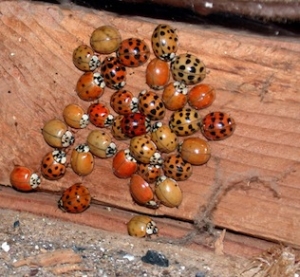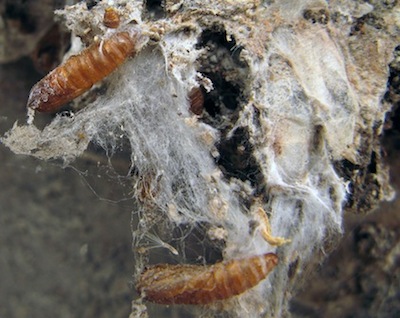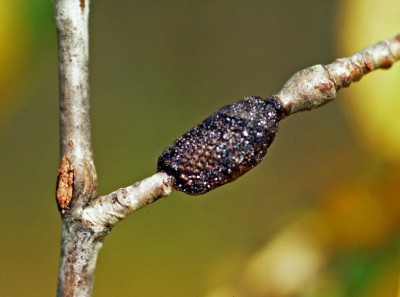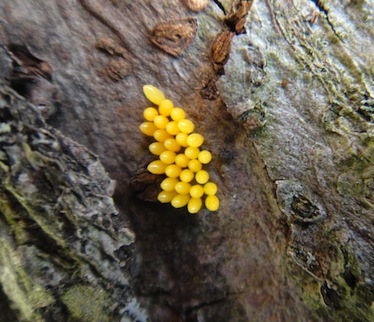Cold Bugs Are Not Active This Winter
By Ray Novitske, Fairfax Master Gardener

Asian Lady Beetles in an attic ready for winter
On New Year’s Day, I walked along the river at Mason Neck State Park as part of the national First Day Hikes at all state parks. I saw several birds mining the shore for insects to serve as their breakfast nibbles. Apparently the 50 degree weather was sufficient for some insects to emerge.
Insects have several methods for surviving our cold winters. Some species survive as eggs, some look for warmth and protection, others put up with the cold, while others “hibernate” so to speak. If we understand these methods, we can more effectively control insects when they emerge in the spring.
The best way to avoid the winter is to look for warm weather, or warmer temperatures. We are all familiar with the monarch butterflies that fly south to spend winters in Mexico. Lady beetles and stink bugs will find warmer temperatures in the cracks and holes in our heated homes and attics. Certain bees will huddle together in a mass or “aggregate” in their hives to conserve heat.

Coddling moth larvae emerging from under winter tree wrap
The formation of ice damages cells, especially a quick freezing or quick thawing. It is the quick, extreme freeze-thaws that are detrimental to these insects. Some overwintering insects can survive freezing if temperatures are more uniform and stable, increasing or decreasing only gradually. Temperatures such as those underground and in protected areas, and even those under a snow cover, are generally more stable and are tolerable. Some of our beetle pests will overwinter in protected areas such as under fallen leaf litter or other ground debris where temperatures rise and fall gradually, and they may overwinter as larvae. This may be a good reason to rake up those leaves in our gardens.

Tent caterpillars spend winter as eggs on a branch
One way some insects survive the winter is to avoid freezing by producing cryoprotectants in their bodies. Just as antifreeze keeps our cars running in freezing temperatures, these insects’ bodies can produce chemicals just before winter sets in to keep them from freezing. These compounds help prevent ice from forming by lowering the freezing temperatures of the fluids in their bodies. Some moths and borers survive in this way. Some overwintering eggs contain these antifreeze compounds too, such as those of the soybean aphid.
Finally, some insects go into a semi-dormant state or “diapause” for the winter. In cold weather, the insects’ development, reproduction, and feeding cease for months. They live off the fat and energy stores built up from the previous season. The trigger to initiate this state can be environmental, such as day length, temperature, or both. The same environmental factors then trigger the reemergence in warmer weather. An abnormal fall, winter, or spring, such as a late or early arrival, can cause problems for these insects.

Lady beetle eggs survive freezing temperatures with cryoprotectants
When insects or their larvae become active in the spring, their food sources must also be ready. If plants or other insects serving as food are not yet available, having been delayed, insect populations that depend on them can be severely affected. Lowered fitness, less reproduction for subsequent generations, and even starvation can occur. For example, if aphids are late in emerging in the spring, the lady beetles that depend on them could have problems.
Be observant of the winter and know the signs to help you prepare for the next season’s pests. Little snow cover along with several severe fluctuating temperature swings during the winter can reduce insects that overwinter in the ground or under leaf litter. An early thaw and then quick freeze can make survival difficult. Slowly emerging plants used as food sources can hurt the insects that depend on them. Know how the winter affects your most troublesome pests, and be prepared for the spring.
References
• Where Do Insects Go in the Winter, Smithsonian Institution
• Insects and the Cold, University of Illinois Extension
• How Insects Survive Cold: The Potential Effect of a Mild Winter, Chris DiFonzo, Fred Springborn,
Megan Chludzinski, Michigan State University Extension
• Where Do Insects Go in Winter?, Michigan State University Extension
• How do insects in Colorado survive the winter, Extension.org
updated 2021